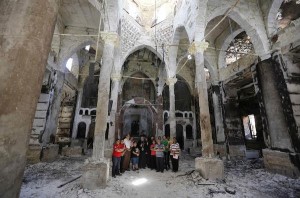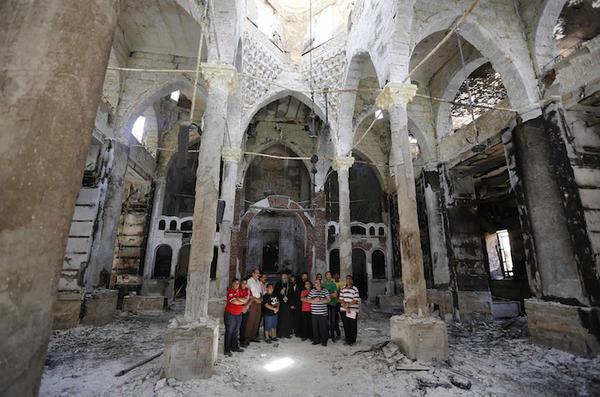Christian Solidarity in the Arab Spring: Responsibility, Suffering and Hope

Since January of 2011, people throughout the world have witnessed Egyptians protesting in the hundreds of thousands, two Egyptian presidents fall at the combined impact of the masses and the military, and the rise of Islamist political parties on the Egyptian political scene. As a PCUSA mission co-worker, these years have been a rollercoaster ride of emotions and opinions. I continue to be surprised by new developments each day and do not know what the future will bring, but I do have real hope for Egypt and its people.
In spite of all that remains unknown, God continues to teach and refine us in and through the events of history we experience. As I consider the impact of these times on my life as a missionary, I am grateful for my increased sense of solidarity with the Egyptians around me. In light of the Incarnation and the conviction that Jesus Christ truly is Emmanuel, “God is with us”, Christians are called to solidarity with other Christians and all those in the broken world around us. The Confession of 1967 describes a Christo-centric shape of mission,
The life, death, resurrection, and promised coming of Jesus Christ has set the pattern for the church’s mission. His life as man involves the church in the common life of [humanity]. His service to [people] commits the church to work for every form of human well-being. His suffering makes the church sensitive to all the sufferings of [humankind] so that it sees the face of Christ in the faces of [people] in every kind of need. His crucifixion discloses to the church God’s judgment on [humankind’s] inhumanity to [all] and the awful consequences of its own complicity in injustice. In the power of the risen Christ and the hope of his coming, the church sees the promise of God’s renewal of [humanity’s] life in society and of God’s victory over all wrong.[1]
This passage sets Christ’s own life as a pattern for each one of us today. As I reflect on my mission work here in the Middle East, I find myself both convicted by my failures and inspired to more faithful service in solidarity with those around me. Taking my cues from the passage above, I will spend the remainder of this reflection on three types of solidarity in Christian mission work today: a solidarity of responsibility, a solidarity of suffering and a solidarity of hope.
Solidarity in Responsibility
The Confession of 1967 claims that Jesus’ “…crucifixion discloses to the church God’s judgment on [humankind’s] inhumanity to [all] and the awful consequences of its own complicity in injustice.” As a foreigner here in Egypt, I often absolve myself from responsibility for Egypt’s problems. Moreover, I can easily distance myself from the comments of American politicians that cause such anger in the Arab streets. Nevertheless, as a current resident of Egypt and as a citizen of the United States, I share in the responsibility of the good, the bad and the ugly in both countries. The cross of Christ reveals the solidarity I share with all humanity in the chaotic consequences of human sin.
The past three years have tragically included various conflicts that have resulted in hundreds of deaths. Inevitably, I will associate myself with one side of the conflict more than the other. At such times, it is very easy to demonize the Other, particularly when they are the aggressor, involved in violent terrorism or motivated by hatred. While any isolated event may well have a guilty party in the conflict, the larger picture of societal interaction portrays a far more ambiguous reality. Martin Luther was fond of reminding his readers that the Christian is “simul justus et peccator”, or, “simultaneously justified and a sinner”. Such a conviction undergirds the solidarity in responsibility I share with others around me for the problems and challenges facing Egypt today. Such a solidarity walks the razor’s edge between falsely assuming blame on the one hand and distancing oneself from “their problems” on the other hand.
Throughout my time at Princeton Seminary, Professor Andrew Walls taught me more about mission than anyone else. His erudite scholarship and embodied theology shaped the way I think about my missionary vocation. In one of our last conversations before I graduated, I asked him for any advice he had for a young missionary hoping to follow in his footsteps. He said, “Well, I do not have advice, but I will tell you a story. When I left for my first missionary post, the greatest desire of my heart was to one day hear my Lord say, “Well done, good and faithful servant.” After three years of mission work, I was clinging to the promise, “Your sins are forgiven.”
In effect, Walls’s story called into question my self-understanding as righteous do-gooder and instead highlighted my identity as a forgiven sinner. In today’s Egypt, we frequently read about clashes that leave scores of people dead and wounded. Terrorist attacks and crimes have skyrocketed. Under these circumstances, it is easy to demonize the Other and effectively cast oneself or one’s allies as the righteous. A solidarity of responsibility acknowledges that each one of us participates in the world’s chaos even as we strive to stand for justice, hope and peace.
Solidarity in Suffering
In the passage from The Confession of 1967 quoted above, we read, “[Christ’s] suffering makes the church sensitive to all the sufferings of [humankind] so that it sees the face of Christ in the faces of [people] in every kind of need.” This obviously applies to people of every race, but also to faces concealed by veils or even the faces of those we consider enemies.
No one can truly feel precisely what another person feels. Nevertheless, Christian discipleship includes a profound empathy or solidarity in suffering. This call transcends religious lines and beckons us to share in the pains, sorrows and losses of all around us, Christians and Muslims alike. Paul implores the Christians of Rome, “Rejoice with those who rejoice, weep with those who weep” (Romans 12:15). As a mission co-worker, I have the privilege of walking with Egyptians through the highs and lows of their lives.
Two days ago, two men on a motorcycle opened fire on a festive crowd of people leaving a Cairo church after a wedding. Four people died and at least 12 more were seriously injured in the attack. Since then, the church has been flooded with Christians and Muslims offering condolences and sharing in the sorrow of the losses. One Arabic slogan summed up the feelings well, “Your blood is my blood, your wound is my wound. One heart, one country against terrorism.” Christ and his church go even further in their unity and solidarity against suffering of every kind.
The challenge of a Christian missionary is to actualize this solidarity in suffering with both those I feel close to and the Other who appears so very different from me. Following an enemy-loving God, we must find a way to emulate Jesus’ care for the suffering, his pursuit of justice and his consummate refusal to hate. A bumper sticker recently spotted in the United States claimed, “Remember, Jesus loves everyone you hate.” No human face is excluded from the high call of seeing the face of Jesus in the faces of those in need.
Solidarity in Hope
Finally, The Confession of 1967 calls us to a defiant hope in the face of the most challenging circumstances. It says, “In the power of the risen Christ and the hope of his coming, the church sees the promise of God’s renewal of [humanity’s] life in society and of God’s victory over all wrong.” Significantly, our hope comes not from the circumstances around us but from the Lord we serve. As such, we are called to a solidarity of hope in the face of even the most difficult conditions.
Reasons for pessimism abound. Concretely, Egyptians face tremendous challenges in the days ahead. The most recent report of the Global Economic Forum rated Egypt dead last in quality of primary education. Economic factors including declining revenues, a growing deficit, a devalued currency and a dramatic reduction in foreign investment and tourism all contribute to growing sense of pessimism among Egyptians. These, and so many more, circumstances look bleak, but the call of the Gospel is to be light and salt in the world. Standing with the Egyptian Christians we work with, we hope to reflect the light and hope of God in our words and labors.
Egyptian Christians have significantly increased their activity in the realms of social and political discourse since January 2011. They are working hard—in spite of tremendously challenging circumstances—to shape a productive and just society for all. Throughout the year-long rule of President Morsi of the Muslim Brotherhood, Christians were often shocked by injustice and discrimination, but they continued to work with great hope for a more just society.
In the midst of all the chaos of the Middle East these days, I am grateful for the steadfast example of Jesus’ life. I pray that the Egyptian church will continue to shine God’s love in its words, ministries and actions so that many more will know the Prince of Peace. Each day here in the Middle East, I feel challenged again to follow the path of Christ in solidarity with others. My hope is that as you read the news about the Middle East, you too will join us in responsibility, suffering and hope.
The author serves in theological education in Egypt.
[1] The Constitution of the Presbyterian Church (U.S.A.), Part I: The Book of Confessions (Louisville: Office of the General Assembly, 1999), 9.32, p. 258.

